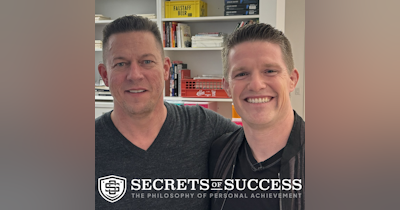Here are 17 lessons from “The Science of Personal Achievement”, which is a collection of Napoleon Hill’s most powerful lessons on success!
Napoleon Hill dedicated over 20 years of his life to interviewing and studying more than 500 of the most successful individuals of his time — including Andrew Carnegie, Henry Ford, and Charles M. Schwab.
His book, The Science of Personal Achievement, is one of my favorites.
It outlines all of the main principles of success he’d come across during his decades of study.
And here I thought it’d be fun to walk through 17 lessons from this book!
Lesson 1. Definiteness of Purpose
"There is one quality which one must possess to win, and that is definiteness of purpose, the knowledge of what one wants, and a burning desire to possess it."
Having a clear purpose is critical for success.
After all… if you don’t know your destination, then how will you get where you want to go?
But it’s not just about setting a goal, but understanding why it’s important to you and being passionate about achieving it. This purpose should act as a guiding star in all your decisions and actions.
Start by asking yourself what you truly desire, and once that’s clear, develop a concrete plan for achieving it.
Lesson 2. The Master Mind Principle
"Two or more people actively engaged in the pursuit of a definite purpose with a positive mental attitude, constitute an unbeatable force."
Two minds are better than one.
In the Master Mind Principle, Hill highlights the power of collaborative effort.
When individuals with a common goal and a positive mindset come together, they create a synergy more potent than their individual efforts!
This is an easy principle to apply.
Surround yourself with people who lift you up and can help you grow. Join a mastermind. Or start your own. This is one of the most powerful secrets to success: hanging out around OTHER successful people.
Lesson 3. Applied Faith
"Faith is a state of mind which may be induced, or created, by affirmation or repeated instructions to the subconscious mind, through the principle of auto-suggestion."
Most people don’t think of “faith” when they think about success.
But this isn’t about your religion — it’s about having an unshakeable belief in your abilities and your purpose.
It's the confidence that your efforts will lead to success, despite any current uncertainties or obstacles.
Reaffirm your belief in yourself and your mission through positive affirmations and visualization techniques. It’s important to nurture a mindset that views failures and setbacks as opportunities for learning and growth.
Lesson 4. Pleasing Personality
"People buy personalities as much as merchandise, and it is a question if they are not influenced more by the personalities with which they come in contact than they are by the merchandise."
Your personality is one of your greatest assets for achieving success.
Because who you are… and how you act… impacts what you attract.
It's about cultivating qualities like empathy, understanding, and a genuine interest in others. This lesson emphasizes the importance of how you present yourself and interact with people.
Active listening, showing respect for others' opinions, and engaging in positive, constructive conversations…
It’s also about being adaptable and flexible in your interactions, showing kindness and a positive demeanor even in challenging situations.
Lesson 5. Going The Extra Mile
"Form the habit of going the extra mile, giving service that is not expected, for this attracts friends, clients, and supporters in many ways."
Going the extra mile is about consistently doing more than what's expected or required.
This is one of my favorite principles!
It's a powerful way to set yourself apart in any field. This principle involves taking initiative, showing exceptional commitment, and delivering quality work that exceeds expectations.
Look for opportunities to add extra value in your personal and professional life. This could mean volunteering for additional responsibilities, helping others without being asked, or simply putting in more effort to ensure excellence in what you do.
Remember, this is a habit.
Consistently going the extra mile can lead to greater opportunities, recognition, and success, as it demonstrates your dedication and sets a high standard for your work ethic.
Lesson 6. Personal Initiative
"Personal initiative is the power that inspires the completion of that which one begins. It is the power that starts all action. No person is free until they learn to do their own thinking and gain the courage to act on their own."
You are the only person who’s responsible for your own success.
Personal initiative is the drive to take action independently, without needing external prompting or encouragement.
It's about being proactive, recognizing opportunities, and acting on them.
Taking personal initiative means being a self-starter, which involves not only generating ideas but also following through with consistent action.
The ability to act on your own shows leadership and can be a key differentiator in achieving personal and professional success.
Lesson 7. Self Discipline
"Discipline comes through self-control. This means that you must control all negative qualities. Before you can control conditions, you must first control yourself. Self-mastery is the hardest job you will ever tackle."
Self-discipline is essential for achieving long-term success.
It's about having control over your emotions, behavior, and desires, directing them towards your goals.
Practice delaying gratification and resist short-term temptations that don’t serve your long-term interests. It’s important to cultivate a strong willpower, which can be strengthened by regularly challenging yourself and stepping out of your comfort zone.
Also, be mindful of your weaknesses and avoid situations where you might be tempted to stray from your goals.
Lesson 8. Controlled Attention
"Concentration requires a definiteness of purpose in such proportion that it becomes an obsession."
Focus is critical.
Prioritize your tasks and concentrate on one thing at a time.
Avoid multitasking, which can dilute your focus and reduce effectiveness. Use techniques like meditation or deep breathing exercises to improve your concentration and mindfulness.
Setting up a conducive environment for work, free from distractions, is also crucial. Regular breaks are important too, as they can refresh your mind and improve focus.
Remember, where you direct your attention ultimately dictates where your energy flows, influencing the outcomes you achieve.
Lesson 9. Enthusiasm
"If you want to do something, work yourself into a state of wild enthusiasm and go to work where you stand, even if it's nothing more than drawing a picture in your mind of the thing you want to do, and keep drawing that picture, making it more vivid all the time."
Be enthusiastic!
When enthusiasm doesn’t come naturally, try to find aspects of your tasks that you find interesting or align them with your personal values. You can also generate enthusiasm by setting challenging yet achievable goals, giving you something exciting to work towards.
Remember to celebrate your achievements, no matter how small, as this can fuel your enthusiasm.
Sharing your goals and progress with supportive friends or colleagues can also amplify your enthusiasm.
Enthusiasm is contagious and can positively influence those around you, creating a more dynamic and inspiring environment.
Lesson 10. Imagination
"Imagination is the most marvelous, miraculous, inconceivably powerful force the world has ever known."
Imagination is the workshop where all plans are created.
Everything you see around you that is man-made… was first just an idea in someone’s head.
Allow yourself the freedom to dream and think big, without the constraints of current realities or limitations. Encourage a curious mind by asking questions, exploring new ideas, and being open to different perspectives.
Many of the world's greatest achievements started as a spark in someone's imagination. Your ability to envision something new and different is a key step in the process of making it a reality.
Lesson 11. Dealing With Adversity
"Every adversity, every failure, every heartache carries with it the seed of an equal or greater benefit."
Adversity is an inevitable part of life and often a necessary step on the path to success.
When faced with adversity, focus on finding solutions rather than dwelling on the problem. Cultivate resilience by reminding yourself of past challenges you’ve overcome.
Learning to detach and view difficulties objectively can help you make better decisions.
Your ability to navigate and grow from these experiences will define your path to success.
Lesson 12. Budgeting Time & Money
"Time is wealth, and unlike money, when it is gone, you cannot replace it."
Effective management of time and money is crucial for achieving your goals.
Use tools like calendars, planners, and apps to schedule and track your activities.
Avoid time-wasters and be disciplined in how you allocate your hours.
For money management, create a budget that reflects your priorities and stick to it.
Be mindful of your spending habits, and focus on investing in things that bring you closer to your goals. Saving a portion of your income and investing wisely can also contribute to long-term financial security.
Remember, how you spend your time and money reflects what you value in life. Prioritizing these resources effectively can accelerate your journey towards success.
Lesson 13. Positive Mental Attitude
"Positive mental attitude is the right mental attitude in all circumstances."
A positive mental attitude is fundamental in achieving success and overcoming challenges. It involves maintaining an optimistic and hopeful outlook, even in difficult situations.
Practice gratitude and focus on the positive aspects of your life and work. Replace negative thoughts with positive affirmations and surround yourself with people who uplift and encourage you.
Challenges and failures are opportunities for learning and growth. Approach them with a positive mindset, seeking the lesson or silver lining in each situation.
Lesson 14. Accurate Thinking
"The truth of the matter is that your emotions are not reliable at all. The emotion of love, for instance, is the greatest and the grandest of all the emotions, and yet it can also be the most dangerous. More trouble in human relationships grows out of misunderstanding the emotion of love than all other sources of difficulty combined."
Accurate thinking is about separating facts from fiction, opinions, or assumptions.
It requires critical analysis and logical reasoning. To think accurately, question your initial reactions and judgments.
Seek out reliable information and evidence before forming conclusions or making decisions. It’s important to be open-minded and willing to adjust your opinions in light of new evidence.
The quality of your thoughts determines the quality of your decisions, which ultimately shapes the path of your life.
Lesson 15. Health
"You can't have good health, prosperity, happiness, or peace of mind if you're going to fear anything--even death, most of all. Personally, I'm looking forward to death with great anticipation. It's going to be one of the most unusual interludes of my whole life."
Health is a critical component of personal achievement.
Maintaining physical, mental, and emotional well-being enables you to pursue your goals with vigor and resilience.
Without it, achieving and enjoying success becomes significantly more challenging. Prioritize self-care and wellness as an integral part of your journey towards personal achievement.
Lesson 16. Cooperation
"Being recognized for personal initiative, a pleasing personality, or outstanding work is a strong motive to inspire cooperation. Give a person recognition when he does a good job; say so, and do something about it."
Cooperation is the act of working together towards a common goal. It's about mutual assistance, sharing knowledge, and supporting each other's efforts.
Encourage a spirit of partnership by actively listening to others' perspectives and incorporating their feedback into your work.
The strength of a team lies in its diversity and the ability to harness different skills and viewpoints for a common purpose.
Lesson 17. Cosmic Habitforce
"Man is not bound by instinct; man is bound only by the imagination and the willpower of his own mind."
Cosmic Habitforce refers to the idea that habits, once established, can become automatic forces that significantly influence our behavior and outcomes.
It underscores the power of establishing positive habits in creating a successful life.
This principle is grounded in the understanding that we are creatures of habit, and by consciously shaping our habits, we can shape our destiny.
Remember, small daily actions compound over time, so the habits you cultivate can either lead you towards or away from your desired outcomes.
Want More?
Join Other High Performers:








